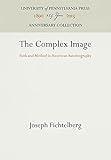The Complex Image : Faith and Method in American Autobiography / Joseph Fichtelberg.
Material type: TextSeries: Anniversary CollectionPublisher: Philadelphia : University of Pennsylvania Press, [2016]Copyright date: ©1990Edition: Reprint 2016Description: 1 online resource (252 p.)Content type:
TextSeries: Anniversary CollectionPublisher: Philadelphia : University of Pennsylvania Press, [2016]Copyright date: ©1990Edition: Reprint 2016Description: 1 online resource (252 p.)Content type: - 9780812281460
- 9781512801835
- 810.9/492 20
- PS366.A88
- online - DeGruyter
- Issued also in print.
| Item type | Current library | Call number | URL | Status | Notes | Barcode | |
|---|---|---|---|---|---|---|---|
 eBook
eBook
|
Biblioteca "Angelicum" Pont. Univ. S.Tommaso d'Aquino Nuvola online | online - DeGruyter (Browse shelf(Opens below)) | Online access | Not for loan (Accesso limitato) | Accesso per gli utenti autorizzati / Access for authorized users | (dgr)9781512801835 |
Frontmatter -- Contents -- Acknowledgments -- 1. Varieties of Self: The Case of Friedrich Nietzsche -- 2. The American Voice: Walt Whitman -- 3. The Corporate Ideal: Thomas Shepard and John Wool man -- 4. Republican Dionysus: Benjamin Franklin -- 5. Black Jeremiah: Frederick Douglass -- 6. Reluctant Modern: Gertrude Stein -- Conclusion -- Notes -- Index
restricted access online access with authorization star
http://purl.org/coar/access_right/c_16ec
In The Complex Image, Joseph Fichtelberg takes a twofold approach to the role of revision in significant American autobiographies. He reexamines the problem of the autobiographical subject from a poststructuralist perspective, and he places that problem in the context of American culture. As a framework for his unique study, he offers a reading of Ecce Homo that argues that Nietzsche's autobiographical "I" is both buried in and created by the text itself. Only by revising his text, by retelling his life to himself, can Nietzsche arrive at self-knowledge. Ultimately, Nietzsche finds himself in all literature everywhere. He becomes a universal soul.Fichtelberg demonstrates that Nietzsche's complex ideas about where subject and language meet in a text can be used to understand the dominant millennial impulse evident in American autobiographies. Thomas Shepard cast the American portion of his autobiography as a compendium of colonial triumphs; John Woolman rearranged his Journal to make a vision of Christian unity its climax; and Walt Whitman fashioned Specimen Days to highlight his late tour of the west during which he realized an earlier poetic vision of national unity. In the nineteenth century, this easy faith in millennial union began to collapse, and Fichtelberg contends that it remained only in the autobiographies of such "marginal" groups as those represented by Frederick Douglass arid Gertrude Stein. He offers a close analysis of their autobiographies and, in a concluding chapter, examines the work of four recent writers: W. E. B. DuBois, Lillian Hellman, Mary McCarthy, and Maya Angelou.The Complex Image will interest scholars and students of American history and literature.
Issued also in print.
Mode of access: Internet via World Wide Web.
In English.
Description based on online resource; title from PDF title page (publisher's Web site, viewed 27. Sep 2021)


